#Postpartum Support
Explore tagged Tumblr posts
Text

Day 3800 - I crave to be part of a thriving local community, so it's time to start working on that! Tried out a support and socializing group for new moms today and had a fun time.
2 notes
·
View notes
Text
The Unsung Heroes: Postpartum Doulas - Nurturing New Moms and Families
Shaina Tranquilino
December 11, 2023
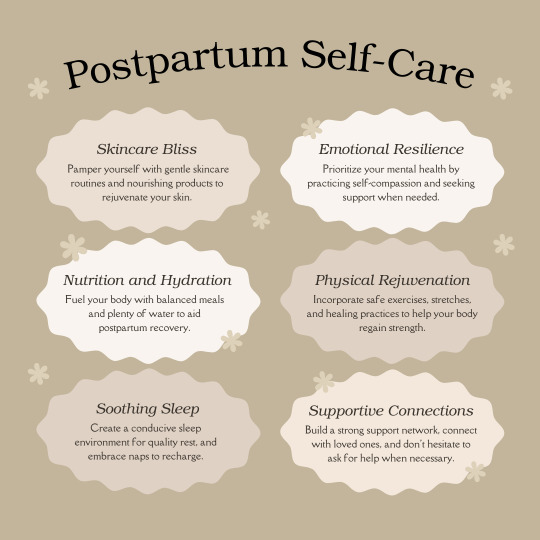
Becoming a parent is an incredible journey filled with joy, love, and countless challenges. While the focus often revolves around the miracle of childbirth, we must not overlook the significance of postpartum care for both mothers and their families. In this blog post, we will explore the vital role of postpartum doulas, shedding light on who they are and what their invaluable support entails.
Who are Postpartum Doulas?
Postpartum doulas are trained professionals who provide physical, emotional, and informational assistance to new parents during the delicate post-birth period. They offer compassionate care to nurture not only mothers but also their entire family unit as they navigate through the early weeks or months after childbirth. These skilled individuals are equipped with expertise in breastfeeding support, newborn care education, maternal recovery guidance, and overall postpartum well-being.
The Role of Postpartum Doulas
1. Emotional Support: Postpartum doulas understand that every mother's experience is unique and may be accompanied by feelings of uncertainty, exhaustion, or even overwhelming joy. With empathetic listening skills and non-judgmental attitudes, these doulas create safe spaces where moms can express themselves freely without fear of being judged. Their unwavering emotional support eases anxiety and fosters confidence in parenting abilities.
2. Physical Assistance: The physical demands of caring for a newborn can be daunting for any parent. Postpartum doulas lend a helping hand by assisting with daily household chores such as meal preparation, laundry duties, and light cleaning tasks. By taking on these responsibilities, they alleviate some of the burdensome workload from new moms' shoulders so they can focus on self-care and bonding with their baby.
3. Breastfeeding Support: One significant area where postpartum doulas excel is in providing breastfeeding guidance. They possess extensive knowledge about lactation, positioning techniques, and troubleshooting common nursing challenges. By offering practical advice and reassurance, they empower mothers to establish a successful breastfeeding relationship with their infants.
4. Newborn Care Education: From swaddling techniques to diaper changing tips, postpartum doulas are a treasure trove of newborn care wisdom. They educate parents on the essentials of baby care such as sleep routines, soothing methods, and recognizing signs of infant distress or illness. Armed with this knowledge, new parents gain confidence in meeting their little one's needs effectively.
5. Advocacy and Information Sharing: Postpartum doulas act as bridges between families and the vast network of healthcare professionals and community resources available to them. They help navigate this complex landscape by connecting parents with reliable information related to pediatricians, support groups, mental health services for mothers experiencing postpartum mood disorders, or even local parent-baby activities.
In our society that often focuses solely on the prenatal journey and childbirth experience, we must acknowledge the significance of comprehensive postpartum care. Postpartum doulas play an invaluable role in supporting new moms during this transformative period by providing emotional stability, physical assistance, breastfeeding support, newborn care education, and acting as advocates for their well-being.
As we strive towards nurturing healthier families overall, it is crucial to recognize the incredible dedication of postpartum doulas who work tirelessly behind the scenes. Their unwavering commitment helps new parents transition into parenthood with grace and confidence while fostering a loving environment where both mom and baby can thrive.
With that being said, the journey of welcoming a new life into the world is filled with both joyous anticipation and immense love. However, sadly, not all pregnancies end in the expected celebration. For families who experience the devastating loss of their baby during pregnancy or labour and delivery, navigating through grief can be an overwhelming and isolating experience. In these trying times, postpartum doulas play a crucial role in providing compassionate support and helping bereaved families cope with their grief.
Understanding the Role of Postpartum Doulas: Postpartum doulas are skilled professionals trained to provide emotional, physical, and informational support to families during the postpartum period. Traditionally known for assisting new parents after childbirth, they have now extended their expertise to offer guidance specifically tailored to those experiencing perinatal loss.
Compassionate Emotional Support: Losing a baby is a deeply personal and heart-wrenching experience that often leaves parents feeling isolated and emotionally shattered. Postpartum doulas who specialize in supporting families dealing with perinatal loss understand the unique needs of grieving parents. They possess remarkable empathy and compassion, creating a safe space where families can openly express their emotions without fear of judgment or misunderstanding.
These doulas offer active listening skills, allowing parents to share their stories, memories, hopes, and fears surrounding their lost child. By offering non-judgmental companionship through active mourning rituals such as holding ceremonies or participating in memory-building activities like journaling or creating keepsakes, postpartum doulas help parents process their emotions while honouring their baby's memory.
Physical Care and Recovery Support: In addition to emotional support, postpartum doulas also assist bereaved parents in managing physical aspects related to pregnancy loss. These may include helping mothers recover from labour, providing guidance on self-care practices and nutrition, or assisting with practical tasks such as meal planning, household chores, or arranging for support from family and friends.
Navigating the Complexities of Grief: Grief is a complex journey that affects individuals differently. Postpartum doulas who specialize in perinatal loss possess an understanding of grief's unique dynamics and can help families navigate its complexities. They provide vital resources and information about various grieving processes, counselling services, support groups, and other bereavement resources tailored to the specific needs of each family.
Advocacy and Education: Postpartum doulas also play a crucial role in advocating for bereaved families within healthcare systems. They facilitate communication between parents and medical professionals, ensuring their concerns are understood and addressed sensitively. Additionally, they educate families about their rights, options for memorializing their baby, and assist them in making informed decisions regarding funeral arrangements or obtaining keepsakes like handprints or photographs.
The pain of losing a baby during pregnancy or childbirth is immeasurable, but no parent should have to face this heartbreak alone. During these challenging times, postpartum doulas specializing in perinatal loss offer invaluable support to grieving families by fostering understanding, empathy, and compassion. By acknowledging the significance of their experience, these doulas help parents honour their baby's memory while navigating through grief towards healing and hope.
#postpartum support#doula care#new mom guide#motherhood help#postpartum wellness#parenting assistance#maternal health#family support#postpartum journey#doula services#mom life balance#newborn care#postpartum recovery#empowered motherhood#parenting resources#infant loss awareness#infant loss
2 notes
·
View notes
Text
Pregnancy is a transformative time filled with excitement and anticipation, but it can also bring challenges, including depression. Depression treatment in Alexandria, Virginia, is crucial for expectant mothers who find themselves struggling with overwhelming feelings of sadness or anxiety. The hormonal changes, physical discomfort, and emotional adjustments that come with pregnancy can significantly impact mental health. Recognizing the signs of depression and seeking help early on can pave the way for a healthier pregnancy experience.
0 notes
Text
Bonding After C-Section: Essential Tips for New Moms
A good friend of mine gave birth two days ago via cesarean delivery. It is her first baby, and she enriched the world with a beautiful princess. When I talked to her to congratulate her on the baby’s birth, she told me she was a bit anxious due to all the issues a cesarean delivery brings with it. So, as a mother who had my diamond via cesarean as well, I thought to help her with some practical…
#Baby Bonding#baby feeding#C-Section Bonding#Cesarean Delivery#Healthy Beginnings#Kangaroo Care#Maternity Journey#Mom Life#new mom life#Newborn Care#parenting tips#Postpartum Support#practical tips for new moms#skin-to-skin contact
0 notes
Text

Have you check out my blog yet?
Blog Post: Trying to Conceive (TTC): The Planning Stages for Growing a Human
0 notes
Text
AHHH my brother and his wife are having a babyyy and they said i can come help out for a couple weeks >:3 maybe i will finally get back to working on my postpartum doula certification and they can be the first of my three required practice families ^^ i was nervous about getting back to that, bc at this point it’s been a year since i last took care of babies, and being a doula is different from nannying anyway… new jobs are so scary! but helping my brother isn’t scary that’s super chill. and then once i’ve done it once it won’t be a new thing anymore and i’ll feel a lot more confident helping strangers!
#a postpartum doula’s job is to support parents as they adjust to life with their new baby#a bit of taking care of the baby but mostly educating and supporting the parents so they feel confident in their choices and abilities#plus practical help like dishes and errands#etc#i know that i will love this job and be very good at it#and it’s about the most money i could possibly make with my bg in childcare and no degree#but i’ve been putting off…#but this is so perfect!!!#the baby’s due in late september so that’s plenty of time to finish my other cert requirements and brush up on all my notes#and to plan for the trip since they live on the other side of the country lol#ahhh i’m so excited!!#silverstarschat
16 notes
·
View notes
Text
New to tumblr.
Hi.
You can call me D.
I'm here to blog about my weight loss//mental health journey. I had a baby 10 weeks ago. He's beautiful and smiles every day now. I love him so much. I, on the other hand, am not and haven't been doing well for years. I should be happier than ever right now. I'm currently in a program for people with depression, anxiety, and PTSD.
I was quite chubby before I got pregnant. Now I'm feeling more like a whale. I don't recognize myself anymore. I refuse to weigh myself because I know it will affect me so badly. I will be doing measurements soon, maybe adding photos later to keep myself accountable.
Advice and support are welcomed. I'm looking to support others as well. I hope to maybe make some buddies who are on a similar journey as I am ♡

#weight loss#postpartum#glow up#health & fitness#mental health#health and wellness#health#sorry for being depressing#i want to lose weight#support#mindfulness#glowup
7 notes
·
View notes
Text
wow i'm done with school. like done done, like submitted my work for review done. like i'm officially a certified doula just waiting for her certification bit to come through, done!!
#my specialties are abortion + grief work... postpartum support in general is what makes my little brain light up :D#ok i'm actually physically and emotionally exhausted bye i'm gonna go cry for a hot second now
8 notes
·
View notes
Text
2 notes
·
View notes
Text
It still really gets me how sincere Andy’s grief over his potential child is. At first you think, oh this is just a weird flight of fancy for him, the idea of having a kid sounds fun but he’s not serious, but over the course of the episode you realise that, no, Andy actually wants children. It exposes something raw and depressing and lovely at Andy’s core and it just hits, how sad he is about what addiction took from him, the years and the growth and a potential life, but the hope that exists in knowing he’s getting better. Andy isn’t ready to be a father right now and it’s good for them both that Teresa chose to have an abortion, but maybe, some day when he’s ready, Andy will get to have a baby with someone who loves him.
#ANDY KING FUTURE DAD DRIVES ME CRAZY#oh you KNOW Errol would be fascinated and grossed out by the concept of pregnancy#occasionally grossed out and trying to be supportive at the same time#but also he would help organise a very cool gender neutral baby shower. it’s dinosaur themed. everyone loves dinosaurs#Tiffany would be 100% matter of fact about the whole thing. ask Andy how he even agreed to get someone to have sex with him#and Sam would be an amazing SIL during pregnancy and Bruce would also be an amazing SIL lol. love Bruce#Sam and Bruce being so loving to their SIL and coddling her and yelling at Andy when he’s even slightly annoying#Gwen would be shocked. if she’s still dating Caspar they’d freak out over whether they want kids. then decide Not To Think About That Now#Val would show up with a care package right to the hospital and croon over the new arrival#and pull Andy aside to tell him he’s gonna be a good dad. and also help postpartum or Val will kill him on behalf of his wife#Ben would be somewhat insulting. but Veronica would be a ray of unhelpful sunshine. they’re trying it’s sweet but messy#oh I love uncle so much <3#uncle bbc#bbc uncle#andy king
13 notes
·
View notes
Text
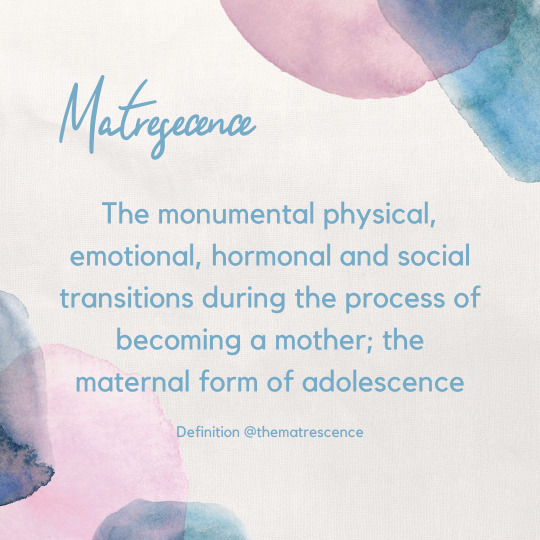
Matrescence - becoming a mother, no ‘bouncing back’ required
Becoming a mother for the first time is a great transition in your life, a rite-of-passage. And not only the first time, but for each time that you become a mother you transition again into a new version of yourself. Each transition is just as significant as the one before. In Western cultures, the focus is largely on the baby that has been born, however the mother is also born each time she gives birth, and this "becoming a mother" piece has largely been left out of our culture entirely. In the same way that we nurture and care for a new baby, we would really do well to remember that the new mother also needs to be nurtured and cared for during this transition.
This critical transition period is Matrescence, and was first coined by an American anthropologist in 1973, Dana Raphael. And although this was first written about in the 1970’s the concept of matrescence has gone completely unacknowledged and unexplored in the medical community, until very recently. There is still so little known about the psychological and physiological effects of becoming a mother - how it affects the brain, the endocrine system, cognition, immunity, the psyche, the microbiome, the sense of self. At a time when a woman is going through a significant rite of passage and is going through massive changes in her physical state, her status within her wider group, her emotional life, her focus, her own identity and in her relationships with everyone around her, she is expected to transition through this stage with ease.
As the author of the recently published book "Matrescence", Lucy Jones, has alluded to - each time that I write the word "matrescence" a red squiggly line immediately appears below it as if to say - this is not real, it doesn't mean anything, it's made up! But it is very real, and the only way to make it even more real is to bring more and more awareness to it, to speak about it to everyone you know. Maybe people will use the argument that they don't want to scare new mothers with horror stories, or that everyone has to go through it for themselves. But there is a huge difference between scaremongering a new mother and presenting her with a term and an explanation for how she is very likely feeling anyway. And if women were to even grow up hearing about this normal transition that happens on entering motherhood, have evidence based information on how it affects your thoughts and emotions, your hormones, your relationships, your sense of self - how much better would they go on to cope with the reality of motherhood if it happens for them? Instead of getting completely side-swiped by a wave of unknowing, of being lost and totally adrift in what we have come to understand as modern motherhood.
The sense of social isolation that can stem from women being ashamed of what they are experiencing and not realising it is actually normal can even trigger feelings of postnatal depression. There are such complicated feelings that can co-exist - having a sense of worry, disappointment, guilt, competition, frustration, anger or even fear alongside the joy of new motherhood. And it is now thought, according to reproductive psychiatrist Alexandra Sacks, who has reintroduced the concept of matrescence in a New York Times article in 2017, that just even knowing that and being aware of what matrescence is can prevent women from getting ill. If you can watch the TED talk given by Alexandra Sacks in 2018 describing matrescence, it will astonish you.
Talking about matrescence and all the parts of motherhood- including the parts that may carry shame for us - is the only way to help mothers feel less stigmatised and more normal in all aspects of becoming a mother. Of course experiencing matrescence without a support network, and without understanding the complexity of what is happening in your brain as a new mother only adds to feelings of not being enough, not being a “good” mother and a sense of failure that can lead to a diagnosis of postnatal depression.
But the question is how much of maternal mental illness is biological and how much is an understandable response to the design of modern parenthood?
One way to claim back the rite-of-passage of motherhood is to surrender to it, embrace every part of it and honour the transition that you have gone through as a mother and as parents. Planning for this postpartum period and putting the framework in place that allows you to be nurtured as the mother is fundamental to the process of matrescence. It is time to honour this monumental transition and enter into motherhood empowered, nurtured and with the confidence that the changes that are happening are normal and expected.
3 notes
·
View notes
Text
Current Offerings~
•Birth Support & End of Life Care
•Postpartum Nourishment, Healing, & Ritual
•Womb Ceremony
*In-person availability Mid-September to Mid-October 2024 in DC/MD/VA - Online 1:1 and birth partners support reopens, 4/12/24*

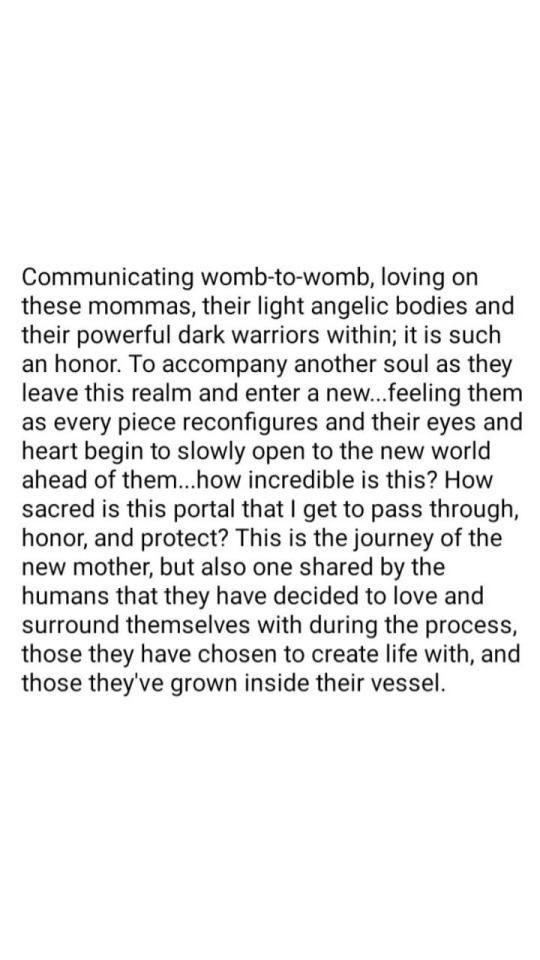
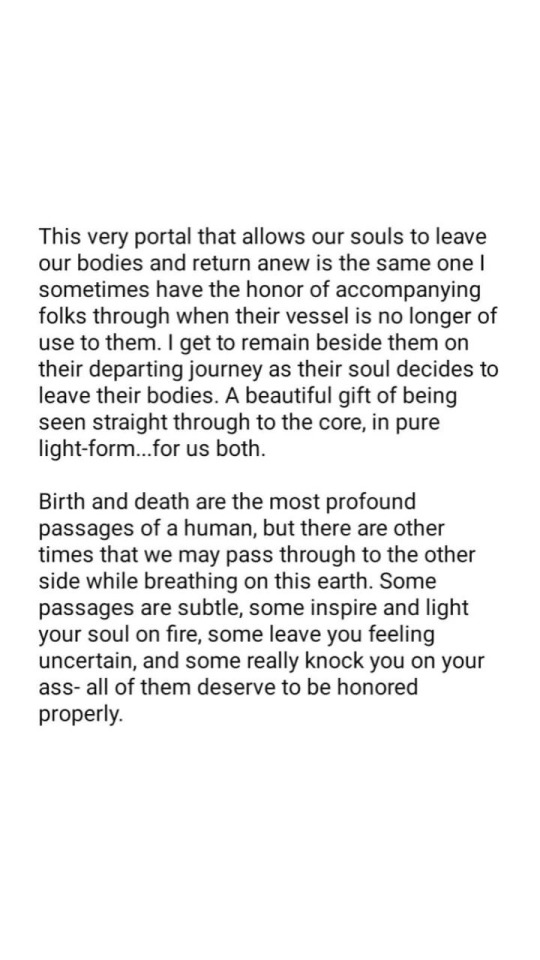

Consultation is free 🩵.. schedule here: https://calendly.com/halobirthsupport
or email, [email protected], for more detailed information
#Birthwork#womb healing#womb trauma#Womb ceremony#Closing of bones#Birth#pregnancy#labor#postpartum#motherhood#mental heath support#mom life#infant care#midwifery#doula#birth support#Healing#death doula
2 notes
·
View notes
Text
one thing about me is even if i hated the book i just read i will still be defending the main character while all the goodreads reviewers go on about how whiny and selfish she is
#hi do you not understand she was 18 and did not get to figure out her own identity before becoming the wife of a grown man#do you not understand how postpartum works lol like she did a bad thing leaving the kid for a few months#but like. definitely worse things a struggling mother can do!#like she was doing all that with zero support because neither of them were connected to their parents at that point#and she didn't get to make any friends because as soon as she came into this city she got pulled into his life#and he's certainly not helping because he's always working and he thinks she has it so easy being with a baby all day#even though he absolutely DOES see how impossible it is to calm the kid and YET#and even when she leaves and he has to do shit himself and sees firsthand he still doesn't acknowledge it much#anyway that was a dumb book but it's like i always go looking to reviews for validation on not liking it and i see that shit#and i'm just like no no she was not the issue#it's literally like.........so many books i read where a woman is Going Through It#and is somehow expected to just be graceful and perfect all the time both within the book and by readers??? like what are y'all on#being rightfully unhappy about your situation does not make you whiny even when you're in the wrong sometimes you need to complain! damn!#and also she rarely did complain that's why she had to just leave because if she had said anything to her husband#about her struggles he would have dismissed her and told her to wait it out#god. i think it was very weird that i didn't see mention of the age difference in other reviews#literally. just graduated high school. he is 28. i'm just.
3 notes
·
View notes
Text
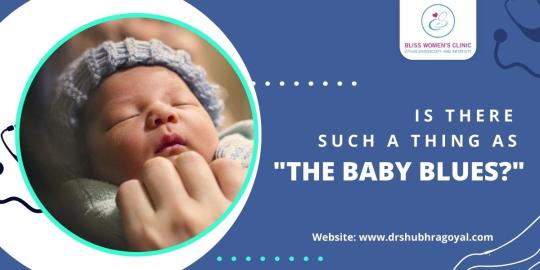
Baby Blues is a common feeling of sadness, irritability, and anxiety that new parents often experience after the birth of a baby. It can affect mothers and fathers and is usually a temporary condition that goes away on its own within a few weeks.
Do Visit: https://www.drshubhragoyal.com/welcome/blogs/is-there-such-a-thing-as-the-baby-blues
#The Baby Blues#Exercise#Sleep#Nutrition#Social Support#Mindfulness and Relaxation Techniques#Management of Postpartum Anxiety#Depression caused by Baby Blues#Best Gynaecologist in Agra#Gynaecologist in Agra#Shubhra Goyal Gynecologist
4 notes
·
View notes
Text
people are SO weird about shauna it's 😑
#especially teen shauna who is horrifically and tragically postpartum with little to no support for it#NO it doesn't excuse her actions but it absolutely explains them
1 note
·
View note
Text

Balance Hormones with Women’s Wellness Teas Need hormonal support during motherhood? Our women's teas help balance, nourish, and calm your body. From pregnancy to postpartum, Niyodo Blossom's teas are your daily ritual for wellness. View this infographic for more information and check our collection.
#Motherhood Teas#Breastfeeding Tea#pregnancy tea#raspberry leaf tea#Postpartum Tea#breastfeeding support tea#womens tea#Niyodo Blossom
0 notes